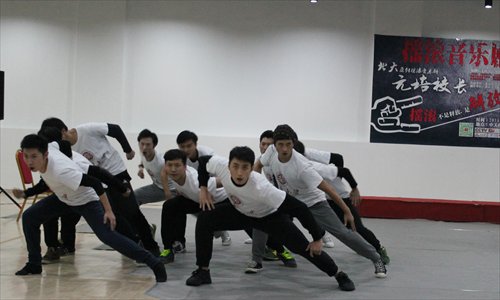HOME >> ARTS
China’s school of rock
By Xu Ming Source:Global Times Published: 2014-11-17 21:13:01
Musical captures passion of century-old youth generation

Graduate students from Peking University practice for the musical President Yuanpei on Saturday. Photo: Xu Ming/GT
At the end of this month and for the first time ever, the life of Cai Yuanpei, a pioneering educator during the 1910s in China and former president of Peking University, will be staged as a musical.Despite the time period the musical is set in, the music in President Yuanpei will be all rock'n'roll, a sharp contrast to the solemnity of the subject of this influential educator's life. However, it is precisely this point that is attracting audience interest.
"It was a time when a sincerely patriotic and passionate group of young people, including Cai Yuanpei, set out to reform society for the better," director Zhou Yingchen told the Global Times. "No other genre of music can fit this spirit better than vigorous and forceful rock music."
In addition to being the first minister of education for the Republic of China (1912-49), Cai Yuanpei (1868-1940) was also a revolutionary and politician who dedicated his entire life to reforming China's traditional education system. His influence on higher education in China can be felt to this day.
The musical delves into Cai's life from 1916-27, during the time he was carrying out major reforms as president of Peking University, and examines the subsequent changes his reforms had on campus and society at large.
A pioneer educator fighting against an entrenched and outdated system, Cai advocated freedom of thought and inclusiveness in education. With his advanced ideas about education, he gathered together a number of influential intellectuals involved in the New Culture and May Fourth movements who were struggling hard for independence, freedom and equality in society, such as Chen Duxiu, Li Dazhao and Hu Shi.
A rehearsal on Saturday showed that even though these influential figures have been interpreted numerous times in many different ways, the musical version manages to inject new blood into these portrayals with its passionate rock music and performances.
The show takes us back to Chinese society as it was 100 years ago, an era pregnant with changes. Literature reform is calling for writers to change from a classical to vernacular style, braids are being cut off as men adapt new fashions, students begin to wear Western-styled clothing and ideas about science and democracy are spreading throughout the land.
"The musical aims to reflect the entirety of the period by drawing a picture of what's happening around Cai," Zhou told the Global Times. "Even today we still can learn from Cai's uncompromising attitude toward the pursuit of truth and academic freedom."
President Yuanpei, written by reputed screenwriter Wang Haiping, uses many important scenes to recreate Cai's life. In many ways his lyrics resemble ancient Chinese poetry by maintaining a good rhythm while also expressing the character's thoughts and feelings in a concise manner.
Though written in a traditional Chinese style, the lyrics go perfectly with the music written by Nathan Wang, a Chinese American Emmy winner who can barely even speak Chinese.
"Most people cannot understand how rock can be used for a musical about Cai Yuanpei. So serious a subject," Zhou said. "It took me some time to decide what music to use, but in the end I still think rock music is the best way to express the spirit of young people during the 1910s and 1920s, with their boiling blood and distinctive character."
While Zhou hopes the play will help China's younger generations to learn more about Cai and other young intellectuals from that time, she is sure the rock style will help attract a younger audience.
"It's due to Cai's keen dedication to reform that we have such a holy land of vitality and reform at Peking University. It's great that they are telling this story with rock music. It's innovative and will have a giant impact," commented Liu Jianwei, a writer and vice director for August First Film Studio, after watching the rehearsal.
Zhou, director of the Ethnic Music and Musical Research Center of Peking University, has been engaged in the research and production of musicals for years. For her, President Yuanpei is yet another of her explorations into Western-styled musicals after Red Lantern and Cao Xue Qin, both of which were well received.
In the musical, the majority of the actors are graduate students from the university's musical major.
"Unlike most performing troupes, this is a musical that stays artistically independent without catering to the market. It is a musical made for musical's sake, and as a musician I have harsh demands," Zhou added, noting that musicals still have a lot of room for improvement in China.
The musical, which was postponed for two years due to lack of capital, is scheduled to hit the stage at the Minzu Theatre in Beijing from November 28-30.
Posted in: Music